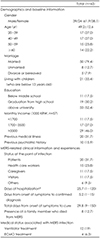Abstract
Objectives
Patients with an infectious diseases during an outbreak can experience extreme fear and traumatic events in addition to suffering from their medical illness. This study examined the long-term impact of the outbreak of Middle East Respiratory Syndrome (MERS) in Korea, 2015 on the mental health of the survivors.
Methods
Sixty-three survivors from MERS were recruited from a prospective cohort study at six hospitals one year after the outbreak in 2015. The Korean-Symptom Check List 95 was administered to evaluate their psychiatric problems and analyzed according to the patient's characteristics and exposure to traumatic events during the outbreak.
Results
A total of 63.5% of survivors suffered from significant psychiatric problems: post-traumatic symptoms (36.5%), sleep problems (36.5%), anxiety (34.9%), and depression (30.2%). Survivors with a history of a ventilator treatment during the MERS epidemic, a family member who died from MERS, and a past psychiatric history showed higher post traumatic stress disorder, anxiety, depression, and suicidality than people who do not have those histories.
Figures and Tables
 | Fig. 1Psychiatric problems of survivors based on the score of the Korean-Symptom Check List 95 one year after Middle East respiratory syndrome outbreak in South Korea, 2015. PTSD : Post traumatic stress disorder. |
Table 2
Comparisons of demographics and clinical information in participants according to a survivor's characteristics and exposure of traumatic events

References
1. Ministry of Health and Welfare. The 2015 MERS outbreak in the Republic of Korea: learning from MERS. Sejong: Ministry of Health and Welfare;2016. p. 185.
2. Kim HC, Yoo SY, Lee BH, Lee SH, Shin HS. Psychiatric findings in suspected and confirmed middle east respiratory syndrome patients quarantined in hospital: a retrospective chart analysis. Psychiatry Investig. 2018; 15:355–360.

3. Wing YK, Leung CM. Mental health impact of severe acute respiratory syndrome: a prospective study. Hong Kong Med J. 2012; 18 Suppl 3:24–27.
4. Mohammed A, Sheikh TL, Gidado S, Poggensee G, Nguku P, Olayinka A, et al. An evaluation of psychological distress and social support of survivors and contacts of Ebola virus disease infection and their relatives in Lagos, Nigeria: a cross sectional study--2014. BMC Public Health. 2015; 15:824.
5. Mak IW, Chu CM, Pan PC, Yiu MG, Chan VL. Long-term psychiatric morbidities among SARS survivors. Gen Hosp Psychiatry. 2009; 31:318–326.

6. Hong X, Currier GW, Zhao X, Jiang Y, Zhou W, Wei J. Posttraumatic stress disorder in convalescent severe acute respiratory syndrome patients: a 4-year follow-up study. Gen Hosp Psychiatry. 2009; 31:546–554.

7. Wilson HW, Amo-Addae M, Kenu E, Ilesanmi OS, Ameme DK, Sackey SO. Post-Ebola syndrome among Ebola virus disease survivors in Montserrado county, Liberia 2016. Biomed Res Int. 2018; 2018:1909410.

8. Vetter P, Kaiser L, Schibler M, Ciglenecki I, Bausch DG. Sequelae of Ebola virus disease: the emergency within the emergency. Lancet Infect Dis. 2016; 16:e82–e91.

9. Mak IW, Chu CM, Pan PC, Yiu MG, Ho SC, Chan VL. Risk factors for chronic post-traumatic stress disorder (PTSD) in SARS survivors. Gen Hosp Psychiatry. 2010; 32:590–598.

11. Cheng SK, Wong CW, Tsang J, Wong KC. Psychological distress and negative appraisals in survivors of severe acute respiratory syndrome (SARS). Psychol Med. 2004; 34:1187–1195.

12. Lee CM, Herridge MS, Gabor JY, Tansey CM, Matte A, Hanly PJ. Chronic sleep disorders in survivors of the acute respiratory distress syndrome. Intensive Care Med. 2009; 35:314–320.

13. Moldofsky H, Patcai J. Chronic widespread musculoskeletal pain, fatigue, depression and disordered sleep in chronic post-SARS syndrome; a case-controlled study. BMC Neurol. 2011; 11:37.

14. Fletcher TE, Fowler RA, Beeching NJ. Understanding organ dysfunction in Ebola virus disease. Intensive Care Med. 2014; 40:1936–1939.

15. Lee SM, Kang WS, Cho AR, Kim T, Park JK. Psychological impact of the 2015 MERS outbreak on hospital workers and quarantined hemodialysis patients. Compr Psychiatry. 2018; 87:123–127.

16. Kim KH, Tandi TE, Choi JW, Moon JM, Kim MS. Middle east respiratory syndrome coronavirus (MERS-CoV) outbreak in South Korea, 2015: epidemiology, characteristics and public health implications. J Hosp Infect. 2017; 95:207–213.

17. Majumder MS, Kluberg SA, Mekaru SR, Brownstein JS. Mortality risk factors for middle east respiratory syndrome outbreak, South Korea, 2015. Emerg Infect Dis. 2015; 21:2088–2090.

18. Sheng B, Cheng SKW, Lau KK, Li HL, Chan ELY. The effects of disease severity, use of corticosteroids and social factors on neuropsychiatric complaints in severe acute respiratory syndrome (SARS) patients at acute and convalescent phases. Eur Psychiatry. 2005; 20:236–342.

19. Majumder MS, Rivers C, Lofgren E, Fisman D. Estimation of MERS-coronavirus reproductive number and case fatality rate for the spring 2014 Saudi Arabia outbreak: insights from publicly available data. PLoS Curr. 2014; 6:ecurrents.outbreaks.98d2f8f3382d84f390736cd5f5fe133c.

20. Davydow DS, Gifford JM, Desai SV, Needham DM, Bienvenu OJ. Posttraumatic stress disorder in general intensive care unit survivors: a systematic review. Gen Hosp Psychiatry. 2008; 30:421–434.

Supplementary Materials
The online-only Data Supplement is available with this article at https://doi.org/10.4306/jknpa.2019.58.3.245.




 PDF
PDF ePub
ePub Citation
Citation Print
Print




 XML Download
XML Download